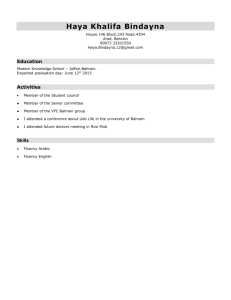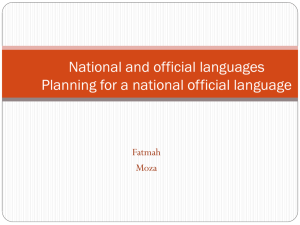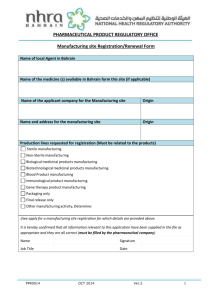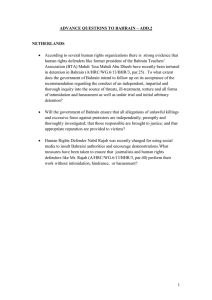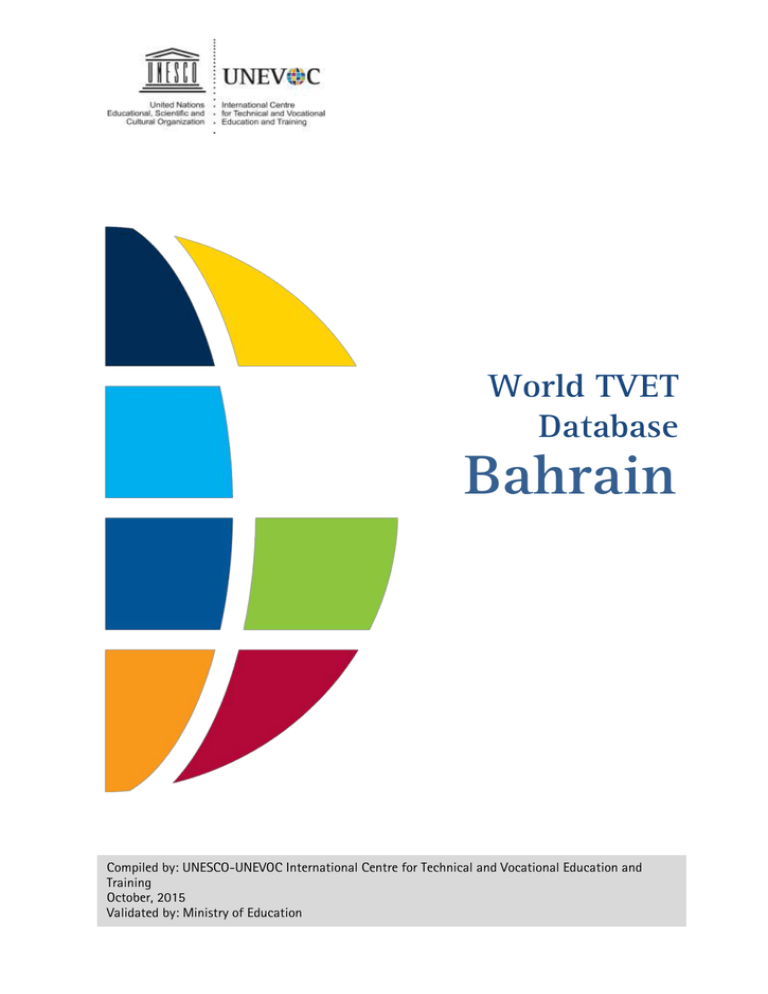
World TVET
Database
Bahrain
Compiled by: UNESCO-UNEVOC International Centre for Technical and Vocational Education and
Training
October, 2015
Validated by: Ministry of Education
World TVET Database Bahrain
October, 2015
Compiled by
UNESCO-UNEVOC International Centre for
Technical and Vocational Education and Training
UN Campus
Platz der Vereinten Nationen 1
53113 Bonn
Germany
Tel: [+49] 228 815 0100
Fax: [+49] 228 815 0119
www.unevoc.unesco.org
unevoc@unesco.org
Country profiles are compiled from a variety of national and international sources and have
been informed and validated by UNEVOC Centres in the country or other TVET national
authorities.
All photos and design are copyright of UNESCO-UNEVOC unless stated otherwise
The designations employed and the presentations of material throughout this report do not
imply the expression of any opinion whatsoever on the part of UNESCO concerning the legal
status of any country, territory, city or area or of its authorities, or concerning the delimitation
of its frontiers or boundaries.
The author is responsible for the choice and the presentation of the facts contained in this
report and for the opinions expressed therein, which are not necessarily those of UNESCO and
do not commit the Organization.
UNEVOC/2015/TVETDB/BHR/1
© UNESCO 2015
All rights reserved
2 | Compiled by UNESCO-UNEVOC (http://www.unevoc.unesco.org/)
World TVET Database Bahrain
October, 2015
Contents
Abbreviations ....................................................................................................................................................4
1. TVET mission, strategy and legislation ...................................................................................................5
2. TVET formal, non-formal and informal systems ..................................................................................7
3. Governance and financing ........................................................................................................................9
4. TVET teachers and trainers ..................................................................................................................... 10
5. Qualifications and Qualifications Frameworks ................................................................................. 11
6. Current reforms, major projects and challenges .............................................................................. 13
7. Links to UNEVOC centres and TVET institutions ............................................................................... 14
8. References and further reading ............................................................................................................ 14
3 | Compiled by UNESCO-UNEVOC (http://www.unevoc.unesco.org/)
World TVET Database Bahrain
October, 2015
Abbreviations
BTC
BTI
DVR
LLL
MOE
COE
MOL
NOS
GDQ
QQA
SIP
GSVEC
Bahrain Teachers College
Bahrain Training Institute
Directorate of Vocational Reviews
Lifelong learning
Ministry of Education
Centre of Excellence for Technical & Vocational Education
Ministry of Labour
National Occupational Standards
The General Directorate of National Qualifications Framework
National Authority for Qualifications and Quality Assurance of Education and
Training
School Improvement Projects
General Secondary Vocational Education Certificate
TVETipedia Glossary
Below are listed TVET terms mentioned in this report. Click on a term to read its definitions on
the UNESCO-UNEVOC TVETipedia glossary.
Basic education
Non-formal education
Evaluation
Qualification
Further education
Quality
Guidance & Counselling
Quality Assurance
Informal Learning
Teacher
Job
Teacher In VET
Labour market
Trainer
Lifelong Learning
TVET
National Qualifications Framework
Upper secondary education
Basic education
Non-formal education
Evaluation
Qualification
Further education
Quality
4 | Compiled by UNESCO-UNEVOC (http://www.unevoc.unesco.org/)
World TVET Database Bahrain
October, 2015
Bahrain
Population:
Youth population1:
Median population age:
Annual population growth
(2010-2015)2:
1,377,000 (2015)
209,000 (2015)
30.3 (2015)
1.76%
Data © OpenStreetMap Design © Mapbox
1. TVET mission, strategy and legislation
TVET mission
Bahrain invests considerably in TVET provision to improve nationals’ skills levels, tackle
unemployment and develop the country as a regional centre for training.
TVET strategy
TVET strategies are supported by Vision 2030. The Vision is a comprehensive economic plan
developed in consultation with the public and private sector, academia and civil society. The
Vision emphasizes the importance of education and defines education as a means to empower
Bahrainis to reach their full potential and provide them with the skills, knowledge and values
that they need to become employed in high-value added positions. Vision 2030 aims to develop
an education system, TVET included, that provides every citizen with educational opportunities
appropriate to their individual needs, aspirations and abilities. The Vision highlights the need for
relevant education and training to the requirements of Bahrain and its economy, delivered to
the highest possible quality standards, and accessible based on ability and merit. This Vision also
aims to develop a clear strategy for raising standards and performance in vocational
institutions, schools and universities.
The Education Reform of 2006, part of the Vision 2030, aims to improve education standards at
every level and to equip youth with the necessary skills and capacities to succeed in the
workplace. The Education Reform is a cross-agency initiative comprising of the following five
objectives:
Developing a Bahraini National Qualifications Framework (NQF);
Implementing School Improvement Projects (SIP) in thirty-one schools, then covered all
government schools;
Establishing the National Authority for Qualifications and Quality Assurance of
Education and Training (QQA);
Establishing the Bahrain Polytechnic; and
Establishing the Bahrain Teachers College.
1
Population aged 14-25
All statistics compiled from the United Nation’s Population Division’s World Population Prospects, the
2015 Revision (http://esa.un.org/unpd/wpp/DVD/)
2
5 | Compiled by UNESCO-UNEVOC (http://www.unevoc.unesco.org/)
World TVET Database Bahrain
October, 2015
TVET legislation
The Royal Decree No. 32 of 2008 and the Royal Decree No. 6 of 2009 have established
and amended the National Authority for Qualifications and Quality Assurance of
Education and Training (QQA) respectively;
The Higher Education Law No. 3 of 2005 has established the Higher Education Council.
The Council has developed by-laws for the management and standards of private higher
education institutions and a by-law for the organization of its own session meeting;
The Constitution of 2002 (Article 7) guarantees the right to education and other
cultural services. Education is free of charge and compulsory at the basic level, and
should develop student’s personality and pride of Arabism. Free and compulsory basic
education is assured in the Education Law No. 27 of 2005; and
The Private Education and Training Institutions Law (1998) outlines requirements for
the establishment of private education and training institutions. It defines the
objectives of private education and training and stipulates its types and divisions, as
well as its management structure.
Sources:
Kingdom of Bahrain (2012). Education Reform. Bahrain Vision 2030. Accessed: 10 September
2014.
UNESCO-IBE (2011). World Data on Education VII Ed. 2010/11. Bahrain. Geneva: UNESCO-IBE.
6 | Compiled by UNESCO-UNEVOC (http://www.unevoc.unesco.org/)
World TVET Database Bahrain
October, 2015
2. TVET formal, non-formal and informal systems
Scheme compiled by UNESCO-UNEVOC from UNESCO-IBE (2011). World Data on Education VII
Ed. 2010/11. Bahrain. Geneva: UNESCO-IBE.
Upon completing six years of primary education, students proceed to an intermediate education
which completes nine years of basic education. Students can continue to a secondary education
which completes twelve years of schooling. Specifically at the secondary education level
students choose between the following tracks: (1) Unified; (2) GSVEC (technical & commercial);
(3) vocational training (boys only); and (4) textile and clothing (girls only). Students are able to
change tracks, if courses are common to more than one specialization.
7 | Compiled by UNESCO-UNEVOC (http://www.unevoc.unesco.org/)
World TVET Database Bahrain
October, 2015
Formal TVET system
Two types of TVET programmes are offered at the secondary education level. Vocational Training
(currently for boys) is offered in technical schools in some specializations and the majority of
students are dropouts of basic education. The Vocational Training Programme lasts two years
only. The second type, the GSVEC, is open to those who obtained the Intermediate School
Certificate or an equivalent qualification. GSVEC is offered in two tracks; technical and
commercial and lasts three years. It helps prepare students for tertiary education or the labour
market. GSVEC Programmes are developed according to a credit hour system. Credit hours are
divided into four groups of courses:
Core Courses ensure that all students follow a certain amount of general knowledge
studies. They cover information, skills and attitudes that help students to continue their
study and personal learning goals. The percentage of core courses in the unified track is
45 per cent, in GSVEC programmes 25 per cent;
Specialized Courses are mandatory courses that form part of a student’s chosen
specialization. They account for 39 per cent of unified curricula and 69 per cent of
GSVEC curricula;
Elective Specialized Courses (supportive) aim to provide thorough knowledge in a
specialized field. The percentage of these courses out of all study requirements is 8 per
cent of general and commercial tracks, and around 6 per cent for GSVEC curricula; and
Free Elective Courses aim to enrich the curriculum, satisfy students' interests and
talents, and achieve a balance and integration between all other core and specialized
courses. The percentage of these courses out of all study requirements is 8 per cent for
unified and around 1 per cent for GSVEC (commercial track only).
In order to complete secondary education students are required to obtain 156 credit hours, and
204 credit hours for the GSVEC programme.
TVET programmes at the tertiary education level are available at universities, colleges and
higher institutes for students who have completed secondary education. Specifically the Bahrain
Polytechnic offers undergraduate programmes in: business, engineering technology, information
and communications technology, and visual design. Programmes normally last eight semesters.
Non-formal and informal TVET systems
The Directorate of Continuous Education in cooperation with many agencies such as the
Directorate of Technical and Vocational Education organizes a variety of lifelong learning and
adult education programmes including specialized short courses that cover auto mechanic skills,
maintenance of electrical appliances, book classification, silk, library management and services,
computer maintenance, the internet, e-commerce, computer literacy, Arabic language and
maths.
In addition, the Bahrain Training Institute (BTI) provides short- and long-term programmes in,
amongst others, business, engineering, and electrical work. The BTI also deals with applications
for the recognition and accreditation of prior learning.
8 | Compiled by UNESCO-UNEVOC (http://www.unevoc.unesco.org/)
World TVET Database Bahrain
October, 2015
Sources:
Embassy of the Kingdom of Bahrain (2014). Bahrain’s Education System. Accessed: 10
September 2014.
Ministry of Education (2014). Non-formal Education. Accessed : 11 September 2014.
UNESCO-IBE (2011). World Data on Education VII Ed. 2010/11. Bahrain. Geneva: UNESCO-IBE.
3. Governance and financing
Governance
The Ministry of Education (MOE) is the main body in charge of public education in Bahrain. The
MOE is responsible for drawing up, implementing and evaluating education polices, directing
and supervising its departments, and serving as the official authority for education in the
country. Its ultimate mission is to enhance the quality and effectiveness of education in line
with international standards as stated by law. Specifically the Undersecretary for Education and
Curricula Affairs – under the MOE – is responsible for curricula and educational supervision,
technical and vocational education, educational services and student activities, and private and
continuous education.
The Ministry of Labour (MOL) is responsible for developing TVET qualifications and operates a
number of training institutes.
Other actors involved in the governance of TVET programmes include:
The Education and Training Development Committee is responsible for: (1) monitoring
education and training initiatives; (2) establishing an independent quality assurance
authority and a TVET instructor and school administrator college; (3) developing a
strategy to attract and encourage quality TVET instructors; and (4) coordinating
between TVET stakeholders to ensure the provision of accurate information on TVET.
The Supreme Council for Vocational Training – under the MOL – is responsible for
developing and monitoring training programmes in the industrial sector. Specifically the
SCVT introduces policies and initiates projects to fill gaps in the labour market and
provide the necessary training for Bahraini workers to grow in their careers. The
Director of Technical & Vocational Education represents the MOE in the council.
The National Authority for Qualifications and Quality Assurance of Education and
Training (QQA) is an independent national body, supervised and attached to the Council
of Ministers. The QQA is responsible for: (1) developing indicators, processes,
mechanisms and guidelines for evaluating the quality of education and training; (2)
developing and carrying out national examinations; (3) reviewing the quality of
education and training institutions; (4) publishing reports on the general status of
education and training in the Kingdom of Bahrain; and (5) collaborating with other
assurance agencies in the region regarding matters relating to quality assurance. The
Directorate of Vocational Reviews (DVR) is responsible for evaluating and reporting on
the quality of vocational education and training provision, identifying strengths and
areas for improvement, spreading best practice and offering policy advice to key
stakeholders, including the Ministry of Labour and the Ministry of Education. The
9 | Compiled by UNESCO-UNEVOC (http://www.unevoc.unesco.org/)
World TVET Database Bahrain
October, 2015
Directorate also works in partnership with other Directorates within the QQA when
needed such as when reviewing technical schools.
Financing
In Bahrain, public sector provision of TVET services is limited. This is mainly because the number
of public TVET providers is relatively small compared with the number of private TVET providers.
The government established and fully equipped four technical schools and six commercial
schools for TVET at the secondary level. They are all free of charge for the Bahraini youth and
residents. School leavers may proceed to government TVET further education institutes such as
BTI and Bahrain Polytechnic at reasonable tuition fees.
Sources:
Webpage of the National Authority for Qualifications and Quality Assurance of Education and
Training. Accessed: 11 September 2014.
UNESCO-IBE (2011). World Data on Education VII Ed. 2010/11. Bahrain. Geneva: UNESCO-IBE.
4. TVET teachers and trainers
TVET Teachers and trainers in Bahrain are trained in the Bahrain Centre of Excellence for
Technical & Vocational Education (COE) and the Bahrain Teachers College (BTC). The COE is a
section in the Directorate of TVET in the MOE, and it provides up-to-date training for all
technical teachers in the GSVEC schools. Some training courses are mandatory for all technical
teachers and they are all conducted in-service. The BTC is part of the University of Bahrain and
was established by the Ministry of Education (MOE) in 2008. The BTC offers programmes,
including:
Bachelor of Education is a four year programme designed for secondary education
graduates and enables them to teach in the primary education level; and
Post-graduate Diploma in Education is for degree holders and is a one year programme
in a specialized teachable subject. Graduates are able to teach in intermediate and
secondary education levels, and can specialize in: English, Arabic, Mathematics,
Science, Business, Physics, Chemistry and Biology.
The BTI offers training programmes in order to develop staff and instructors for the Bahrain
Training Institute.
Sources:
Webpage of the Bahrain Teachers College. Accessed: 11 September 2014.
Webpage of the Bahrain Training Institute. Accessed: 11 September 2014.
10 | Compiled by UNESCO-UNEVOC (http://www.unevoc.unesco.org/)
World TVET Database Bahrain
October, 2015
5. Qualifications and Qualifications Frameworks
Secondary vocational education
Programme
Duration
Unified (Science, Commercial, 3 years
Literacy)
GSVEC
(Technical,
Commercial)
Qualification
Tawjahiya;
(General
Secondary School Certificate);
Tawjahiya
(Commercial);
Tawjahiya (Technical)
Post-secondary vocational education
Programme
Undergraduate
Further education
Duration
4 years
1-3 years
Qualification
Bachelor Degree
National Certificate (NC)
Higher National Certificate
(HNC)
Higher National Diploma
(HND)
National Qualifications Framework (NQF)
The Bahrain Qualifications Framework is a single national qualifications framework which
recognizes all forms of learning, including higher education, vocational, school, and work-based
qualifications. Specifically the NQF aims to promote the recognition of all qualifications and
forms of learning, and allow national qualifications to be compared with international
qualifications. The NQF has ten levels, as follows:
11 | Compiled by UNESCO-UNEVOC (http://www.unevoc.unesco.org/)
World TVET Database Bahrain
October, 2015
Scheme extracted from Quality Assurance Authority for Education and Training (2014). National
Qualifications Framework.
Quality assurance
The National Authority for Qualifications and Quality Assurance of Education and Training
(QQA) is responsible for monitoring and evaluating the performance of education and training
institutions in Bahrain. Specifically the Directorate of Vocational Reviews (DVR) – under the
QQA – is responsible for evaluating the quality of TVET programmes and institutions. The DVR’s
main objectives are to:
Monitor and report on the quality of TVET provision in Bahrain;
Identify strengths and areas for improvement;
Develop a culture of openness, self-regulation and continuous improvement;
Encourage best practices; and
Provide advice on how to address weaknesses; and
Offer policy advice to key stakeholders, including the Ministry of Labour and the
Ministry of Education.
The DVR carries out evaluations according to a review framework which includes a set of quality
assurance criteria focused on: (1) student achievement; (2) quality of teaching and training; (3)
quality of programmes; (4) support and guidance for learners; and (5) effectiveness of the
12 | Compiled by UNESCO-UNEVOC (http://www.unevoc.unesco.org/)
World TVET Database Bahrain
October, 2015
leadership and management. Institutions are given one of the following grades: outstanding,
good, satisfactory, or inadequate.
On the basis of evaluations, institutions are required to submit an action plan to address the
recommendations published in the DVR report. Institutions deemed inadequate are subjected to
up to two monitoring visits, and the implementation of the actions plans are evaluated into
three levels: (1) sufficient progress; (2) in progress; and (3) insufficient progress.
Sources:
Quality Assurance Authority for Education and Training (2014). Directorate of Vocational
Reviews. Accessed: 10 September 2014.
Quality Assurance Authority for Education and Training (2014). National Qualifications
Framework. Accessed: 10 September 2014.
6. Current reforms, major projects and challenges
Current reforms and major projects
Current policy initiatives and reforms regarding the TVET system are being directed by Vision
2030. In addition a number of projects are in place, including:
(1) The National Occupational Standards Project aims to increase the role of the private sector,
encourage entrepreneurship, and lay the foundation for quality investment in training and
education. The objectives of the project are to:
Develop 125 new National Occupational Standards (NOS) for skilled work in Bahrain;
Enhance the capacity development of local personnel and stakeholders;
Develop and revise national policies, and establish management frameworks necessary
for the implementation and application of the NOS.
NOS are defined as the competencies (skills, knowledge, attitudes) individuals need in order to
carry out a particular occupational roles and functions. NOS are developed in collaboration with
industry and companies in Bahrain.
(2) The School Improvement Project (SIP) currently covers all government schools and aims to
improve the quality of: schools performance, strategic planning, teaching and learning, selfevaluation and data collection. Importantly e-learning contributes effectively in this regard and
consolidates communication between the parties involved in the teaching-learning process.
Challenges
According to the National Authority for Qualifications and Quality Assurance of Education and
Training (QQA) Annual Report 2013, most TVET institutes have taken significant steps in:
improving the provision, procedures and practices in relation to evaluating student performance
and curricula; the quality of training and teaching; and the effectiveness of support provided to
enhance students’ achievement. Despite this a number of TVET institutions still lack a systematic
13 | Compiled by UNESCO-UNEVOC (http://www.unevoc.unesco.org/)
World TVET Database Bahrain
October, 2015
mechanism for incorporating all available information on students’ attainment and achievement
into their decision-making processes. Other challenges include to:
Develop clear strategic goals based on key performance indicators when implementing
operational planning;
Enhance assessment tools and improve the verification and utilization of assessment
outcomes;
Improve teacher training programmes by developing teaching and training methods to
address the needs of the students. Teaching should be based on up-to-date records
regarding student’s performances, and should be based on pre-course and continuous
assessment in planning; and
Improve the self-evaluation procedures of institutions by encouraging more critical and
evidence-based evaluation, which clearly identifies areas of improvement.
Sources:
Embassy of the Kingdom of Bahrain (2014). Bahrain’s Education System. Accessed: 10
September 2014.
High Council for Vocational Training (2013). Development of National Occupational Standards
for the Kingdom of Bahrain. Presented 20 November at the 5th Arab-German Education
and Vocational Training Forum in Berlin, Germany. Accessed: 10 September 2014.
Ministry of Education (2014). Minister’s Speech. Accessed: 10 September 2014.
Quality Assurance Authority for Education and Training (2013). Annual Report 2013. Accessed:
10 September 2014.
7. Links to UNEVOC centres and TVET institutions
UNEVOC Centres
Ministry of Education
TVET Institutions
Bahrain Teachers College
Bahrain Training Institute
Ministry of Education
National Authority for Qualifications and Quality Assurance of Education and Training
8. References and further reading
References
Embassy of the Kingdom of Bahrain (2014). Bahrain’s Education System. Accessed: 10
September 2014.
14 | Compiled by UNESCO-UNEVOC (http://www.unevoc.unesco.org/)
World TVET Database Bahrain
October, 2015
High Council for Vocational Training (2013). Development of National Occupational Standards
for the Kingdom of Bahrain. Presented 20 November at the 5th Arab-German Education
and Vocational Training Forum in Berlin, Germany. Accessed: 10 September 2014.
Kingdom of Bahrain (2012). Education Reform. Bahrain Vision 2030. Accessed: 10 September
2014.
Ministry of Education (2014). Minister’s Speech. Accessed: 10 September 2014.
Ministry of Education (2014). Non-formal Education. Accessed: 11 September 2014.
Quality Assurance Authority for Education and Training (2013). Annual Report 2013. Accessed:
10 September 2014.
Quality Assurance Authority for Education and Training (2014). Directorate of Vocational
Reviews. Accessed: 10 September 2014.
Quality Assurance Authority for Education and Training (2014). National Qualifications
Framework. Accessed: 10 September 2014.
UNESCO-IBE (2011). World Data on Education, VII Ed. 2010/11. Bahrain. Geneva: UNESCO-IBE.
Webpage of the Bahrain Teachers College. Accessed: 11 September 2014.
Webpage of the Bahrain Training Institute. Accessed: 11 September 2014.
Webpage of the National Authority for Qualifications and Quality Assurance of Education and
Training. Accessed: 11 September 2014.
Further reading
Webpage of the Ministry of Education
Webpage of the National Authority for Qualifications and Quality Assurance of Education and
Training
15 | Compiled by UNESCO-UNEVOC (http://www.unevoc.unesco.org/)

